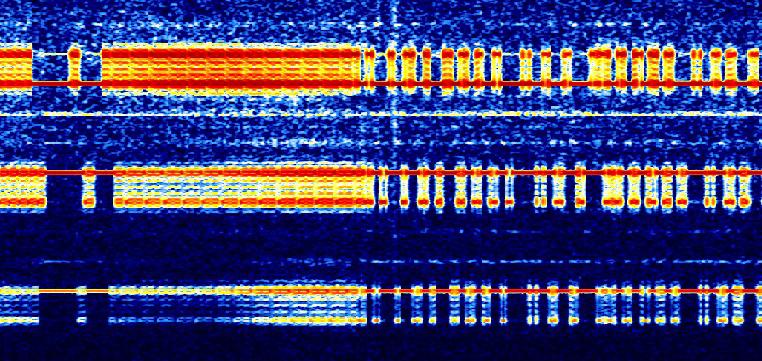If you’ve gotten into software-defined radio (SDR) in the last five years, you’re not alone. A lot of hackers out there are listening in to the previously unheard. But what do you do when you find an interesting signal and you don’t know what it is? Head on over to the Signal Identification Wiki! You’ll find recordings and waterfall plots for a ton of radio signals categorized by frequency band as well as their use.
Or, conversely, maybe you’ve just got a new radio and you want to test it out. What would be a fun challenge to receive? Signals in the catalog range from the mundane, like this smart home energy meter from California, or a Chrysler tire-pressure monitoring system to (probably) secret military or intelligence transmissions.
If you’re looking at a waterfall plot and you’re not sure what to make of it, the sigidwiki is worth a look. And it’s a wiki, so if you’ve got a cool signal and you want to add it, create an account and get to it!
Thanks to [mkie] for the tip!
















Awesome, thanks for the tip!
This wiki is awesome! was looking for something like this for ages :3
yeah same here
And if you don’t have an SDR, trying playing with this very capable online one in Holland:
http://websdr.ewi.utwente.nl:8901
It is reviewed here:
https://www.youtube.com/watch?v=davFs5Zh6WA
You can even establish an account and mark frequencies for later listening. I’m listening to North Atlantic air traffic control on 8906 kHz USB right now.
You know what we need? An inexpensive SDR that mates via USB with smartphones.
Agreed. They’ve also got an awesome multi-band active antenna. I’ve even used the Twente site to pick up radiofax from Asia (japan and korea).
If propagation is good, you can pick up any HF signal with a screwdriver. Although Twente is hearing a lot, if you are nearby like me, you can compare the signals with your own antenna setup and see/hear the differences.
@Michael W. Perry
I always thought the Germans were the ones being ignorant and referring to “The Netherlands” as “Holland”.
Dutch here. A lot of foreigners refer to The Netherlands as Holland (e.g. in Mexico, where I live). Even I do so now and then but since I was born in Zuid-Holland I am technically correct. Great video on this: https://www.youtube.com/watch?v=eE_IUPInEuc
Actual the Germans “say” “Die Niederlande”, so the ignorance lies elsewhere this time.
Oddly enough I’ve also heard the location referred to as the Low Countries. Eventually I realized why.
The germans also say ‘Holländer’ half the time, and ‘Holländische’ Gemüse (vegetables) andsoforth.
This again.. IT IS THE SAME THING, everybody in the world including in the netherlands uses holland and the netherlands interchangeable in colloquial use.
The biggest difference is that netherlands is used more by international minded dutch who speak english and listen to foreign (mostly US) music whereas holland is used by the more nationally minded who listen to dutch music and are more focused on local culture.
@Michael W. Perry: You can use a DVB TV dongle with the RTL2832U chip and a USB OTG cable with this app for Android phones: http://sdrtouch.com/
You won’t really get HF with a receiver like that, but it is possible to use an upconverter (powered separately): http://www.nooelec.com/store/ham-it-up.html
I just bypassed the front-end mixer and connected the antenna directly to the ADC, with good results in the HF band. You can improve this with an extra balun and fm band filter
You can’t receive euro traffic control for the atlantic located in ireland (shannon) that well with a receiver in the U.S., you would have more luck with a web-receiver in europe.
Agreed that websdr is pretty cool and hasn’t been ruined by internet trolls yet. As Zach A. mentioned SDR Touch and an RTLSDR, but also RF Analyzer w/ a HackRF. To have more modes implemented is the big barrier (I’m not sure how to implement these algorithms or port them to this app). https://github.com/demantz/RFAnalyzer
Any smartphone is also an SDR.
How can I tune the smartphone to the frequency I want, and how to demodulate by software?
The RTL-SDR sticks can be used with smartphones via usb-otg. BUt without a converter they only go down to 24MHz.
Aha! So the signal I heard the other day with a preamble that sounded like a church bell was http://www.sigidwiki.com/wiki/Codan_Data_Modem!! THANKS for the info! Exactly what I was just needing, after the article on WebSDR here on HaD.
Strangley enough that sound resembles RTTY tweeting. I’ve heard it before on a very old radio a very long time ago.
Interesting idea. A Wiki to support identifying unknown signals.
It’s hard to search for specific waterfalls though, when you have a large connection you go mad looking at each one to see the one you are trying to figure out.
But yes it’s a great thing to have available nonetheless.
It would be nice if it had google-image-search type of stuff, but that falls well outside the realm of a normal site to run, you’d not only have to compare a complex waveform but you’d also need to turn the image entered into a usable form.
But perhaps someone could make a web-based utility where you could submit an audio file and have ti tell you what it is by analyzing it. Although that would also not be easy it would be much easier than picture-based.
I meant: large collection*
And an addendum: the wiki at least divides it in various categories/frequency bands, I think there is also a site that just has them all non-categorized which is really troublesome to use.
Excellent… maybe we can find out what the signal is that hammers the 30m band regularly for an hour with a huge bandwidth DRM-like pattern?
You guys broke the site. It’s down.. haahahaaha. Seriously, damnit. I wanted to see this.